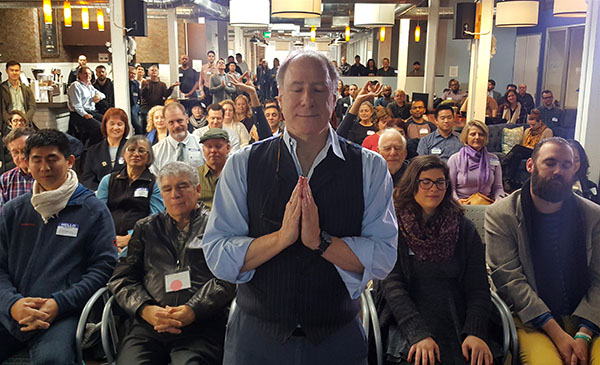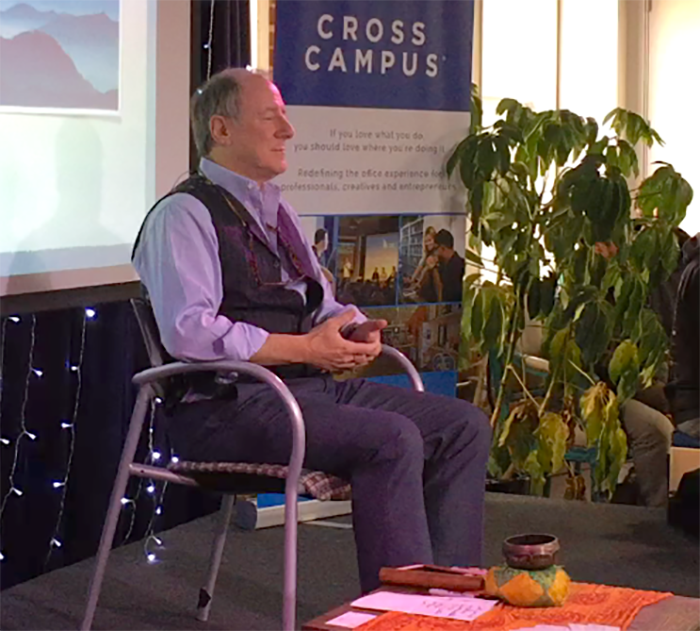
fit

Nicholas Stein became a certified mindfulness teacher as a way to keep himself motivated and help others at the same time.
By Sarah Le I Epoch Times Staff
Just a few years ago, Nicholas Stein had it all—a dream career, a beautiful wife, and good family relationships. He produced a popular action-packed television series for National Geographic called “Border Wars,” where his team was embedded with law enforcement along the U.S.-Mexico border. But there was a dark side.
“Everywhere we went, we saw absolutely horrendous human suffering,” he said at a recent presentation for entrepreneurs with Innovate Pasadena in Pasadena, California.
Stein said the Border Patrol officers faced intensely stressful and violent events, such as drug smuggling and even deaths, on a regular basis. They often rescued large groups of destitute migrants, only to arrest them and deport them soon after. Stein said he was left with symptoms similar to PTSD.
Then the unthinkable happened. National Geographic was bought by 21st Century Fox, and Stein was fired from his job as showrunner. He was re-assigned to teaching his replacement how to do his job.
To make matters worse, his marriage was falling apart. Then the most important person in Stein’s life, his father, passed away. Stein said he was a mess.
“I lost my job in a humiliating, anxiety-ridden way, my wife and I are on the cusp of divorce, and my dad dies. So I’m not good,” he said.
Even Stein’s therapist was causing him further headaches by constantly asking him to check out something called Mindfulness-Based Stress Reduction (MBSR) over their weekly Skype chats.
“I kept saying, ‘I don’t want to talk about mindfulness. I want to talk about my problems,— he said. Finally, out of desperation, he agreed. The results were unexpected.
“[It’s] profoundly changing to people,” said Brian Shiers, a mindfulness facilitator certified with UCLA’s Mindful Awareness Research Center. “Your life is going to become a little more clear. You’re going to be seeing it in different ways.”
Stein took an off campus class in Los Angeles from Shiers to learn how to practice mindfulness, which is essentially “attention training,” said Stein. It’s based on MBSR, a secularized form of Buddhist meditation designed by Jon Kabat-Zinn in the 1970s at the University of Massachusetts Medical School.
SARAH LE/EPOCH TIMES

Family and friends noticed that Stein was calmer and better at listening after starting his practice.
By quieting the body in a meditative setting, participants quickly see that their mind just doesn’t stop, with distracting thoughts arising one after another. Trying to actively suppress them does not work. The goal is simply to remember to bring one’s focus back to the here and now, an exercise similar to training a muscle.
For many people, the mind is often lost in reliving past memories, agonizing over the future, or trying desperately to shut out painful or uncomfortable realities.
“This is a terrible way to live. You’re not really paying attention to the thing you’re supposed to be paying attention to,” said Stein.
But when you focus on the present moment, “nothing else exists. The past is gone. The future is speculation.”
Through this practice, participants become more in tune and honest with themselves. They eventually learn to regulate their emotional states, which helps to keep them calm and focused in their day-to-day life.
There are also five essential qualities that participants must develop, said Shiers during a recent phone interview.
“We’re also cultivating curiosity, acceptance, non-judgment, kindness, and compassion, so that people are able to tolerate what they notice and see it from different vantage points,” he said.
Without these tools, he said, meditators might hate what they see or experience within themselves, or become re-traumatized. They won’t notice and start to change their own patterns of behavior, and they might even make things worse.
But when a meditator embraces these positive qualities, then the healing begins, almost like magic.
A study published Jan. 24 in the journal Psychiatry Research found that mindfulness meditation training reduced stress hormones and inflammatory responses in anxiety disorder patients following a stressful situation, while patients who took a different training had worsened responses.
Dr. Elizabeth A. Hoge, associate professor in Georgetown University Medical Center's Department of Psychiatry, said in a press release, “Mindfulness meditation training is a relatively inexpensive and low-stigma treatment approach, and these findings strengthen the case that it can improve resilience to stress.”
Shiers and other researchers have also found that mindfulness meditation actually alters the structure of the brain.
Consistent meditators were shown to have an enhanced prefrontal cortex, the part of the brain that regulates the ability to sustain attention, filter information, plan and complete goals, actively solve problems, and manage relationships, which are all affected by emotional regulation.
These meditators also had a smaller amygdala, the part of the brain most directly related to fear, anxiety, aggression, and the fight-or-flight response. After three or four months of meditating every day, going to UCLA classes, reading, and listening to podcasts, Stein found that he was paying more attention to his wife and his marriage was healing. “At one point, she just turned to me out of nowhere, and she said, ‘Where’s my husband, and what have you done with him?’” he said. They will soon celebrate their 26th wedding anniversary.
For many people, the mind is often lost in reliving past memories, agonizing over the future, or trying desperately to shut out painful or uncomfortable realities.
Stein also quit drinking as a kind of experiment, to give himself a better grasp of how the meditation was working, and he said he never looked back. He came to realize that nearly everyone around him was obsessed with drinking, and he was happy to not have to bother with it anymore.
Other people noticed that Stein was more calm, more interested in other people, and had become a better listener.
“I’m a better husband, better uncle, friend, brother, and they all have commented on it.”
Stein decided to become a certified mindfulness teacher himself, partly as motivation to continue his daily practice, which he says is not easy.
“Lots of people start meditating, and then can’t find time for it. Next thing you know, they are as miserable as they were before they started,” he said.
One of the most unique places Stein has taught is inside the Los Angeles County Men’s Central Jail. He and other teachers walked the cell blocks and talked to the inmates behind bars about how meditation could help them cope with the stresses of their ongoing court situations, time away from family, and simply being in jail. Stein said the inmates were almost all appreciative of the simple yet practical techniques.
Some Proven Benefits of Mindfullness and Meditation
1. Reduces Anxiety
2. Improves Sleep
3. Raises Self-Confidence
4. Improves Cognition
5. Reduces Distractions
6. Music Sounds Better
7. Supports Weight-Loss Goals
8. Decreases Feelings of Loneliness in the Elderly
This is part of Stein’s idea to bring mindfulness to those who need it most, as well as those who make the biggest impact on the public, including prison guards, police officers, public defenders, prosecutors, parole officers, and judges.
Of course, the biggest reason for this focus comes from Stein’s own experiences with the daily trauma experienced by the Border Patrol, ICE agents, and other law enforcement while filming “Border Wars.” Stein has even held a presentation on mindfulness with Border Patrol officers and is now working on a curriculum.
Various law enforcement agencies around the country, professional sports teams, schools, large corporations, and high-profile celebrities such as Hugh Jackman and Emma Watson have all professed to have found benefits from practicing mindfulness in recent years. And the popularity of mindfulness continues to grow.
Stein encourages everyone to try it out, even if it’s just for five minutesa day.
“You will change your life if you stick to this practice,” he said.
Out of desperation, and with the encouragement of his therapist, Stein took a class in Mindfulness-Based Stress Reduction.